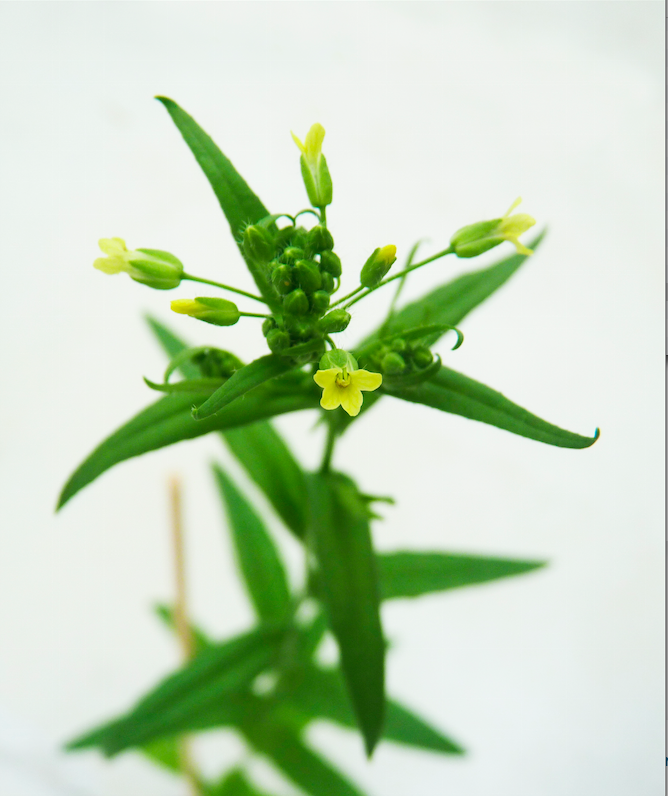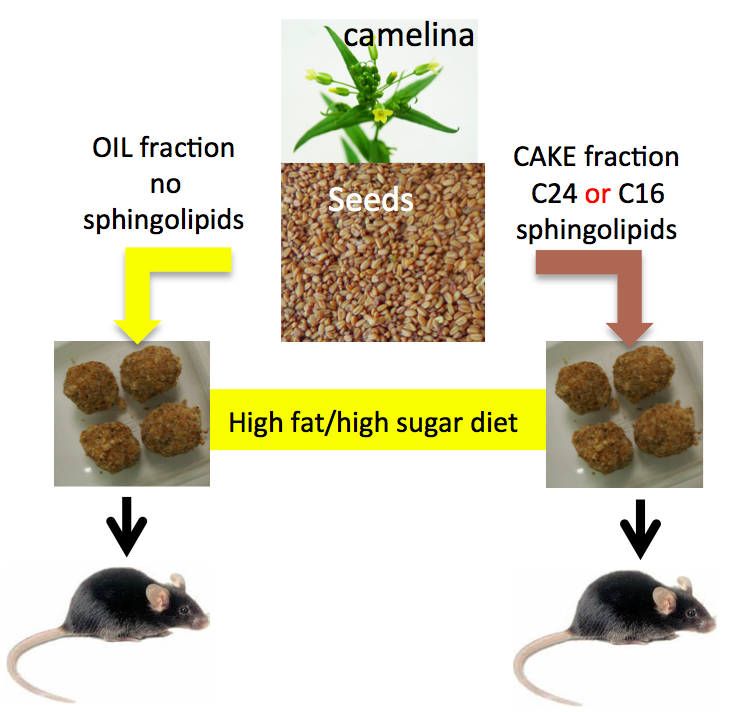Our goal is to better understand lipid metabolism and its role during plant development. Our findings will help developping new breeding strategies to improve oil quality in the context of more sustainable agriculture. Lipid biosynthesis has important applications in the context of oilseed crop diversification both for production but also for the end-uses. Camelina sativa, a rediscovered European crop, turned out to be a great translational model to validate new traits since its genome is very close to that of Arabidopsis, has a short life cycle and is very easily amenable to genetic modification.

The fact that Camelina showed a very low ability of crosses to wild relatives provide an opportunity to also use this specie for translational research and field trials (Julie-Galau et al. 2013).
Fatty acyl desaturation
Desaturation of oleic acid by the FAD2 and FAD3 desaturase allows the synthesis of the omega6 linoleic acid and omega3 linolenic acid. Selective, targeted mutagenesis of the three delta-12-desaturase (FAD2) genes was achieved in the translational model Camelina sativa by CRISPR-Cas9 gene editing providing a large diversity of Camelina lines with various lipid profiles, ranging from 10% to 62% oleic acid accumulation in the oil (Morineau et al. 2017). Two of these lines were cultivated in the first european field trials of gene edited plants demonstrating the importance of agronomic evaluation of gene edited traits (Faure and Napier 2018). The involvement of polyunsaturated fatty acids in abiotic stress response are currently being investigated. New gene editing approaches are being tested to further modify polyunsaturated fatty acyl profile of camelina.
Sphingolipid biosynthesis
This project funded by AgroParisTech aims in increasing different type of sphingolipid in Camelina seeds and to evaluate their nutritional and health effects. Camelina seed cake was found to positively impact metabolic syndrome onset and gut inflammation (Hermier et al. 2019). Modification of sphingolipid acyl chain length has a specific effect on sphingolipid digestibility. Currently several strategies including synthetic biology, are carried out target specific sphingolipid into the oil fraction.


The fact that Camelina showed a very low ability of crosses to wild relatives provide an opportunity to also use this specie for translational research and field trials (Julie-Galau et al. 2013).
Fatty acyl desaturation
Desaturation of oleic acid by the FAD2 and FAD3 desaturase allows the synthesis of the omega6 linoleic acid and omega3 linolenic acid. Selective, targeted mutagenesis of the three delta-12-desaturase (FAD2) genes was achieved in the translational model Camelina sativa by CRISPR-Cas9 gene editing providing a large diversity of Camelina lines with various lipid profiles, ranging from 10% to 62% oleic acid accumulation in the oil (Morineau et al. 2017). Two of these lines were cultivated in the first european field trials of gene edited plants demonstrating the importance of agronomic evaluation of gene edited traits (Faure and Napier 2018). The involvement of polyunsaturated fatty acids in abiotic stress response are currently being investigated. New gene editing approaches are being tested to further modify polyunsaturated fatty acyl profile of camelina.
Sphingolipid biosynthesis
This project funded by AgroParisTech aims in increasing different type of sphingolipid in Camelina seeds and to evaluate their nutritional and health effects. Camelina seed cake was found to positively impact metabolic syndrome onset and gut inflammation (Hermier et al. 2019). Modification of sphingolipid acyl chain length has a specific effect on sphingolipid digestibility. Currently several strategies including synthetic biology, are carried out target specific sphingolipid into the oil fraction.


Contacts
Cell Differentiation and PolarityGroup leader